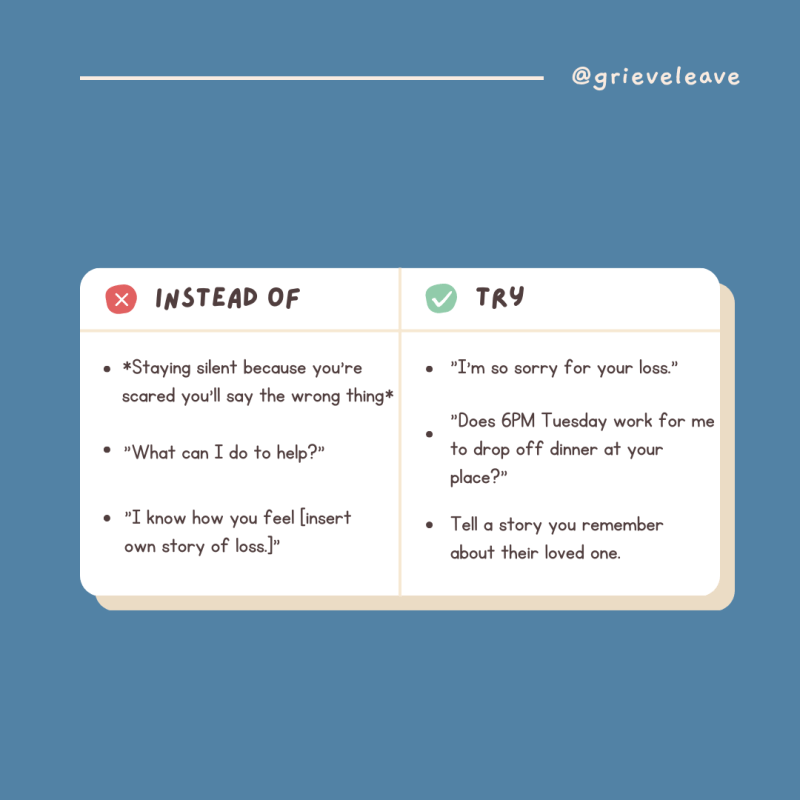What To Say To Someone Whose Family Member Has Cancer – We use cookies to improve your experience. By accepting, you agree to our Cookie Policy. Read about opting out.
The cake is very important for integrity and transparency. We follow a strict editorial process to provide you with the best content possible. We may also earn a commission for purchases made through affiliate links. As an Amazon Associate, we benefit from qualifying purchases. Read more in our affiliate disclosure.
What To Say To Someone Whose Family Member Has Cancer

When you are supporting a loved one who is sick or dying, both your actions and your words matter. Your friend, family member, or acquaintance may not show you, but they may be looking for people like you in their life to give you some relief in a difficult situation.
Things You Should Never Say To Someone Who’s Adopting
If you are writing a message of sympathy to someone who has a sick family member, try to imagine yourself in their shoes, or think of a time when you went through something similar. What would you like to hear? What
Read on for some tips and examples of what to say to someone who has a sick family member.
Dealing with a family member in the hospital can be fraught with turmoil, stress, and uncertainty. With a family member in the hospital, your friend or loved one may feel pressured to balance work, family, and visiting their loved one in the hospital. When they are not at their family member’s bedside, they may feel stressed and unable to rest.
If you want to go the extra mile to support someone who has a family member in the hospital, consider giving them a gift box of snacks that they brought their family member, or a simple get-together card to share with a loved one.
Condolence Messages That Will Help You Find The Right Words
Sometimes, just reaching out to let someone know you’re there is enough. There are many simple yet supportive things you can say even when someone is dealing with a seriously ill family member. Here are some ideas.
Create a free end-of-life planning profile and instantly share your health, legal, funeral and estate decisions with your loved one.
When a loved one is dealing with a serious illness and near death, it can be an incredible challenge to find the right words to offer comfort and support.

In these difficult times, a heartfelt message can make a big difference, convey your sympathy and let someone know they are not alone. Here are some examples of messages you can send to someone who has a sick and dying family member.
Video Unit 5 Online Exercise For
If one of your close friends or partner is dealing with a sick family member, your role is very important.
Feel free to make the following suggestions your own. This list is not exhaustive. If it feels right, you can also try to help your friend or partner focus on positive things, even distracting them – but again, use caution and empathy.
When talking to an acquaintance or co-worker who is going through a difficult time with a sick family member, remember your relationship to the setting. Your consent can be meaningful, but you must first measure the validity.
Trust how you feel, and understand that some people may not openly share their feelings. If they distract from your best wishes, don’t take them too seriously. Here are some ways to show support for a coworker who has a sick family member.
Quotes About Keeping Family Together: Bond With Love
Sometimes, finding the right words is about avoiding saying things that can do more harm than good.
For example, according to Psychology Today, being optimistic can sometimes make a person feel lonely and afraid. Toxic hope is a real thing. Be aware of it as you interact with people who are going through a traumatic event.
When comforting a sick loved one, it is important to be sensitive and considerate while keeping their needs in mind. Here are some examples of things you should avoid saying.

Remember, it’s important to listen carefully, show empathy, and ask how you can support them instead of assuming what they need. Everyone’s experience with illness and grief is unique, so tailoring your words to each person’s situation is important.
Grief Connect® On Linkedin: Abc News On Instagram:
When someone we care about is struggling with a sick loved one, it can be challenging to know how to best support them. It is important to remember that each person’s needs and preferences may be different, but there are several ways we can show empathy and provide comfort. Here are some tips for giving your support.
One of the most important ways to support someone during that difficult time is to continue to reach out to them and check in on them. Even a text or phone call to express your concern and ask how they are doing can make a big difference. A consistent follow-up, rather than a one-time message, shows that you really care and are there to provide support whenever needed.
An open ear is one of the best gifts you can give someone who is facing a difficult challenge like a sick loved one. You can open the door to conversation by asking questions about their loved one’s condition, treatment, and any other concerns. Allow them to share their thoughts and feelings without judgment or interruption.
Active listening and showing genuine interest can provide great comfort and solace. Remember, the focus should be on the person you support. If they are not comfortable talking, don’t push the issue. Just let them know you are there if they want to talk.
Condolence Messages To Send A Coworker
While it’s natural to ask about the health of a sick loved one, don’t forget to ask your support person how they’re doing, too. They may experience a variety of emotions such as anxiety, stress, or fatigue. By asking about their emotional well-being, you create an opportunity for them to share their feelings and seek comfort or reassurance if needed.
Giving is a meaningful way to show your support. Instead of thinking about what they might need, ask the person directly how you can be helpful. This question empowers them to tell you what they really need most, whether it’s running errands, providing food, providing transportation, or lending a listening ear. Your willingness to help can ease some of the burdens they may be facing.
If someone has trouble thinking about things they might need help with, it’s okay to say no when you offer them help. But you can brainstorm different ideas of things you can do to provide practical help and see if any of them sound helpful to your loved one. Here are some ideas:

In difficult times, maintaining some sense of normalcy can provide much-needed respite. Provide opportunities for distraction or relaxation through activities that the person enjoys. Whether it’s going for a walk, watching a movie, or enjoying a shared hobby, these moments can temporarily relieve the emotional weight we may be carrying.
Words Of Sympathy: What To Say When Someone You Know Faces A Loss
Everyone copes differently, and some people may prefer to keep their challenges private. Respect their boundaries and privacy by not posting or sharing their status without their permission. Be sensitive to their needs, and support them accordingly.
No matter what kind of trying situations your loved one, acquaintance, or co-worker is going through, offering love and kind words during a difficult time can provide real support.
Try to imagine yourself in their shoes: what would you want or need to hear? Or think of someone else in your life who dealt with a sick relative. What made them feel better? After all, it may not be the specific words you choose, but your intention behind them. If your intention is to comfort someone, they will hear you.
If you need more ideas on how to be there for your loved one, check out our guides for sympathy gift ideas, how to sign a sympathy card, and how to write a condolence email. Everyone who is grieving is different, so there are different ways to express your sympathy that may best suit your person.
Condolence Messages & Sympathy Notes To Comfort Friends Or Family
For people who have never experienced a major loss (death of a loved one, divorce, job loss, scary diagnosis, etc.), reaching out to someone who has can be intimidating.
However, more than that, reluctance to reach out/total avoidance of contact has more to do with being uncomfortable with the idea of being vulnerable with your feelings. Being vulnerable is HARD, we get it!
And of course, even for people who have suffered a great loss, reaching out to another person can bring up feelings that you try to keep tight inside…and are afraid to let out. We get that too.
:max_bytes(150000):strip_icc()/whyyourehavingdreamsaboutdeath-final-078be2d9b84e4d6887bfbc7625058bbc.png?strip=all)
No matter how you feel, we’re here to help! Loss can feel isolating and lonely, so we always recommend trying to connect, whether it’s in person, on the phone, by text, card, or email.
Helpful Things You Can Say To A Friend Or Family Member Who Is An Addict
Offer some help and make a plan to do it: “Hi, I’d like to bring you dinner one night this week. What’s your address and what’s the best time for me to stop by?”
Add a parenthetical to any message you send or any voicemail
What to say to someone whose mother has cancer, what to say to someone whose family member has cancer, what to say to someone whose family member died, what to say to someone whose parent has dementia, what to say to someone whose spouse has cancer, what to say to someone whose dad has cancer, what to say to someone whose parent has cancer, what to say to someone whose mother has died, what to say to someone whose parent has died, what to say to someone whose relative has cancer, what to say to someone whose loved one has cancer, what to say to someone whose dad has died






